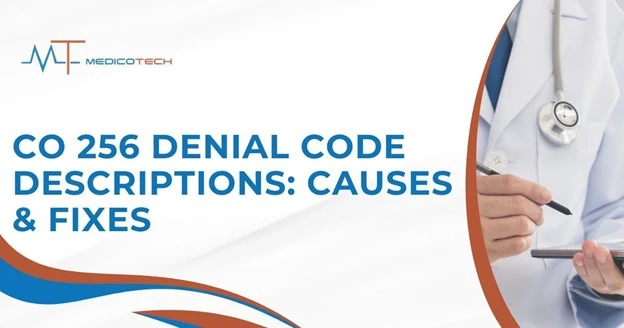What is CPT Code 90791?
90791 CPT Code is the Psychiatric Diagnostic Evaluation of licensed mental health professionals. This assessment is a key initial step in comprehending the mental health status of a patient, developing a diagnosis, and developing a treatment plan. CPT Code 90791 is most commonly applied to initial assessment and new patients, but may be applied to assessments of existing patients when their condition has substantially changed.
The evaluation involves a comprehensive biopsychosocial assessment, including:
- Patient history (medical, psychiatric, and social)
- Mental status examination (MSE)
- Establishment of a tentative diagnosis
- Treatment recommendations
It’s important to note that CPT 90791 excludes any medical services, such as prescribing medication, which is where 90791 CPT Code would be used.
How to Use 90791 CPT Code for Accurate Billing and Reimbursement
Accurate billing for CPT Code 90791 is essential to avoid claim denials and ensure proper reimbursement. Here’s how to maximize reimbursement for mental health providers:
- Ensure the service aligns with the code’s requirements: CPT 90791 should only be used for an initial diagnostic evaluation, not for ongoing therapy sessions. If a patient requires follow-up or ongoing care, use 90834 or 90837.
- Complete and accurate documentation: The key to avoiding errors and ensuring payment is thorough documentation, including a detailed mental health history, mental status exam, and any relevant assessments.
- Follow payer-specific guidelines: While CPT 90791 is generally accepted by most insurance providers, the rates and requirements may vary. Ensure to check each patient’s eligibility and verify if pre-authorization is needed.
- Use of correct modifiers: If telehealth services are provided, include the 95 modifier to indicate that the service was delivered via telemedicine.
Key Benefits of CPT Code 90791 for Mental Health Providers
Using CPT Code 90791 correctly can significantly benefit mental health professionals in the following ways:
- Higher reimbursement: CPT Code 90791 typically receives higher reimbursement rates compared to standard psychotherapy codes (e.g., 90834 or 90837) due to the comprehensive nature of the evaluation.
- Streamlined billing for initial assessments: This code helps mental health professionals receive appropriate compensation for the time and expertise involved in conducting a detailed initial evaluation.
- Improved patient care: By correctly documenting the evaluation and creating a solid treatment plan, providers set a strong foundation for effective ongoing care.
- Avoiding claim denials: Proper use of CPT 90791 reduces the chances of claim rejections or delays, ensuring smoother cash flow for the practice.
CPT Code 90791 vs 90792: What’s the Difference?
While both 90791 and 90792 are used for psychiatric diagnostic evaluations, there’s a key distinction:
- CPT 90791: This code applies to psychiatric diagnostic examinations and no medical services. It is applied when a mental health practitioner (so, a psychologist or clinical social worker) analyzes the mental health status of a patient but does not prescribe medicine or other medical treatment.
- CPT 90792: This is a psychiatric assessment and medical service. It involves other medical services, including the prescription of medications or the ordering of diagnostic tests. 90792 can only be utilized by psychiatrists or psychiatric nurse practitioners because they are licensed to offer medical services.
Understanding the difference between these codes ensures accurate billing and prevents claim denials or audits.
When and Why to Use 90791 CPT Code for Initial Psychiatric Evaluations
CPT Code 90791 is specifically used for the initial diagnostic evaluation with new patients or established patients with significant changes in their condition. It’s typically used in the following situations:
- New patients: When a patient first seeks psychiatric care, 90791 is used to assess their mental health, identify symptoms, and establish a diagnosis and treatment plan.
- Reevaluations after a prolonged absence: If a patient has been away for 6 months or longer, and their condition requires a comprehensive reassessment, 90791 can be used again.
- New mental health concerns: For established patients who present with new symptoms or conditions substantially different from their prior mental health issues, 90791 may be used for a complete reassessment.
By using CPT 90791, providers can ensure that each initial assessment is thoroughly documented, setting the stage for a tailored treatment plan.
CPT Code 90791 Documentation Requirements: A Step-by-Step Guide
The accuracy of your documentation directly impacts the success of your CPT 90791 claims. Here’s a step-by-step guide to what needs to be included in your documentation:
- Patient Identification: Include the patient’s name, date of birth, session start and end times, and place of service on all pages.
- Presenting Problem: Describe the reason for the evaluation and the patient’s chief complaint.
- Psychiatric and Medical History: Collect a complete medical and psychiatric history, including family history of mental health conditions and any substance use history.
- Mental Status Exam (MSE): Include at least five elements of the MSE, which evaluates cognitive, emotional, and behavioral functioning.
- Risk Assessment: Document any suicidal ideation, self-harm risk, or homicidal ideation if applicable.
- Treatment Plan: Outline the initial treatment plan, including recommended interventions, the expected length of treatment, and measurable goals
- Signatures: Ensure that the clinician’s name, credentials, and signature appear at the end of the documentation.
Common Mistakes to Avoid When Using CPT Code 90791
While CPT Code 90791 is a crucial code for mental health billing, mistakes are common. Here’s a list of errors to avoid:
- Misusing 90791 for follow-up sessions: This code is for initial evaluations only. If you’re performing therapy, use 90834 or 90837.
- Failure to document thoroughly: Incomplete documentation can lead to claim denials. Ensure that every section is detailed and clear.
- Using 90791 when medical services are involved: If you prescribe medication or perform a physical exam, use 90792 instead.
- Billing more than once per year: 90791 can typically only be billed once per patient per provider per year. Billing it multiple times without justification can trigger an audit.
How 90791 CPT Code Helps Improve Reimbursement for Mental Health Services
Properly using CPT Code 90791 can lead to higher reimbursement rates compared to other codes like 90834 or 90837. Here’s how:
- Comprehensive service: The thorough nature of the initial diagnostic evaluation justifies a higher rate of reimbursement.
- Accurate representation of services: By documenting the complete mental health history and current symptoms, you ensure that the service is described accurately for proper reimbursement.
- Avoiding claim denials: Correct use and documentation help reduce errors, preventing unnecessary claim denials or payment delays.
Eligibility for Billing CPT Code 90791: Who Can Use It?
90791 CPT Code can be billed by a range of licensed mental health professionals who are qualified to perform a psychiatric diagnostic evaluation. This includes:
- Licensed Clinical Social Workers (LCSWs)
- Clinical Psychologists
- Licensed Marriage and Family Therapists (LMFTs)
- Licensed Professional Counselors (LPCs)
- Psychiatrists
Providers should always check their state regulations and insurance provider requirements to confirm eligibility and ensure compliance.
Understanding the Time Requirements for CPT Code 90791 Sessions
90791 CPT Code has no time limit per se, but the average time spent in the session is 45-60 minutes. CMS requirements state that the assessment should take at least 16 minutes and not more than 90 minutes. When the session is more than 90 minutes, add-on codes such as 99354 will be used to add time.
With these rules you can be assured that you have documented your sessions correctly and that they are coded to be reimbursed.
How to Maximize Reimbursement with CPT Code 90791
To maximize reimbursement for CPT Code 90791, ensure that you are not only using it correctly but also leveraging every opportunity to meet documentation and payer requirements. Here’s how:
- Thorough Documentation: The more detailed your documentation, the higher your chances of successful reimbursement. Include all the necessary elements such as a mental status exam, psychosocial history, diagnostic impressions, treatment recommendations, and patient risk assessments.
- Check Patient Eligibility: Verify the patient’s insurance plan before performing the diagnostic evaluation to confirm coverage for CPT 90791. This avoids any surprise rejections or delays.
- Know Payer Policies: Understand each payer’s unique reimbursement policies. Some insurers may pay a higher rate for initial assessments, while others may have specific documentation or coding requirements.
- Avoid Billing Errors: Ensure the CPT 90791 code is used only for initial assessments and not for ongoing therapy or follow-up sessions, as these require different codes (e.g., 90834, 90837).
By following these strategies, mental health providers can streamline their billing practices and receive fair reimbursement for their diagnostic services.
CPT Code 90791 and Telehealth: Billing for Remote Psychiatric Evaluations
90791 CPT Code can be used for telehealth psychiatric diagnostic evaluations, making it easier for mental health professionals to provide care remotely. Here’s what you need to know:
- Telehealth Modifiers: Telehealth services can be billed via the use of a 95 modifier to synchronous telemedicine. This denotes that the service was rendered through interactive audio and video systems (in real time).
- Checking whether the Telehealth services are covered: Not all insurance companies cover telehealth services, and it is always important to check and ensure CPT 90791 can be billed to cover telehealth evaluation.
- Telehealth documentation: As with in-person assessments, telehealth should be well documented. Make sure that you cover the same important points: presenting problem, mental status exam, diagnostic impressions, and treatment plan.
Using CPT 90791 for remote evaluations ensures that patients receive the necessary assessments while providers get reimbursed for their time, even when not in a traditional office setting.
Modifiers for 90791 CPT Code: Essential Codes You Need to Know
There are certain modifiers that might be necessary to guarantee the proper billing and reimbursement of CPT 90791. These modifiers provide a contextual detail to the service offered and this may have an impact on reimbursement. Here are some important ones:
- Modifier 52: Used when the service provided is reduced or less comprehensive than what’s typically described by the CPT code.
- Modifier 59: Indicates that the procedure was a distinct procedural service, used when multiple services are provided on the same day that aren’t typically reported together.
- Modifier 95: Required when the psychiatric diagnostic evaluation is performed via telemedicine.
- Modifier 90785: Applied for interactive complexity, such as when there is involvement of family members, non-verbal patients, or other complicating factors.
Using the correct modifier ensures your claims are processed correctly and that you’re reimbursed at the right rate for the services rendered.
Real-Life Examples of Using CPT Code 90791 for Mental Health Billing
Let’s look at some real-life examples of when and how CPT Code 90791 is used effectively:
Case 1: Initial Evaluation for a New Patient
- Patient: Sarah, 29, presents with anxiety and depression.
- Process: During the initial evaluation, the therapist conducts a comprehensive assessment of Sarah’s history, current symptoms, and mental status.
- Outcome: CPT Code 90791 is used to bill for the initial diagnostic evaluation, setting up Sarah’s treatment plan, including therapy for her depression.
Case 2: Reevaluation After a Long Absence
- Patient: John, 40, returns after a 12-month absence due to worsening anxiety.
- Process: The therapist conducts a detailed reevaluation of John’s symptoms, including his family history and risk assessments.
- Outcome: 90791 CPT Code is used for the comprehensive reassessment after a prolonged absence, with a new treatment plan for his anxiety.
These examples highlight how CPT Code 90791 is used for initial evaluations, re-evaluations, and establishing a comprehensive treatment plan.
CPT Code 90791 Reimbursement Rates: What You Need to Know in 2025
Reimbursement for CPT Code 90791 varies depending on a few key factors, including your geographic location, provider credentials, and insurance provider. Here’s an overview of what to expect:
Medicare Reimbursement Rates
- 2025 National Average: $164.50
- 2024 National Average: $172.10
- 2023 National Average: $174.86
Private Insurance Rates
- LCSWs and LPCs: $90 – $150 per session
- Psychologists (PhD or PsyD): $110 – $200 per session
- Psychiatrists: $150 – $300 per session
Rates can vary based on payer contracts, so it’s essential to verify each client’s insurance coverage before billing.
Best Practices for Billing CPT Code 90791 and Avoiding Common Errors
To ensure successful billing and avoid common mistakes, here are some best practices for CPT Code 90791:
- Accurate Use: Use 90791 only for initial diagnostic evaluations. If you’re providing therapy or follow-up services, use the appropriate therapy codes, like 90834 or 90837.
- Detailed Documentation: Always document a thorough mental status exam, patient history, and treatment plan to justify the need for the evaluation.
- Verify Eligibility: Check the patient’s insurance eligibility and authorization requirements before the session. Some insurers may limit the number of diagnostic evaluations per year.
- Use Correct Modifiers: If the session involves telehealth or interactive complexity, ensure that you use the correct modifiers to ensure full reimbursement.
By following these best practices, you can avoid billing errors, denials, and delays in reimbursement.
How to Ensure Accurate Billing for Initial Psychiatric Diagnostic Evaluations
Ensuring accurate billing for CPT 90791 requires adherence to the following steps:
- Complete Assessment: Provide a thorough evaluation that includes all components, such as history-taking, mental status exams, and psychosocial assessments.
- Comprehensive Documentation: Maintain detailed notes on the patient’s presenting problem, diagnosis, and treatment plan to support the medical necessity of the evaluation.
- Verify Coverage: Confirm that the patient’s insurance provider covers CPT 90791, and check if any pre-authorization is required.
- Timely Submissions: Submit claims promptly and ensure all the required ICD-10 codes and modifiers are included to avoid any delays in payment.
CPT Code 90791 for Co-Occurring Disorders: When to Use It
CPT Code 90791 is crucial when assessing co-occurring disorders (e.g., mental health and substance use disorders). It should be used in the following scenarios:
- Dual Diagnosis: If a patient presents with both mental health and substance use disorders, 90791 allows the clinician to comprehensively assess both conditions and establish a unified treatment plan.
- Integrated Treatment Plans: Use CPT 90791 to create an integrated treatment approach addressing all of the patient’s concerns, ensuring a holistic care plan.
How Often Can You Bill CPT Code 90791 for a Single Client?
The CPT 90791 code can typically be billed once per year per provider for the same patient. However, some insurance plans may allow it every six months if there are significant changes in the patient’s condition or if the patient returns after a long absence.
Always verify the specific billing guidelines with the insurance provider to avoid overuse of the code and ensure proper reimbursement.
Complete Guide to 90791 CPT Code: Requirements, Guidelines, and Best Practices
Overall, CPT Code 90791 is an important instrument that mental health professionals should use as a first-time psychiatric assessor. Understanding how it is used, its documentation needs, modifiers, and reimbursement rates will help providers to maximize their reimbursement, to bill appropriately, and to deliver improved care to their patients.
To keep your practice commercial and financially viable, always keep abreast of the payer guidelines, use the appropriate modifiers regarding telehealth or interactivity complexity, and adequately document it.




